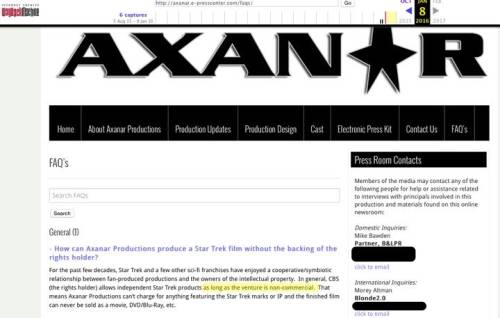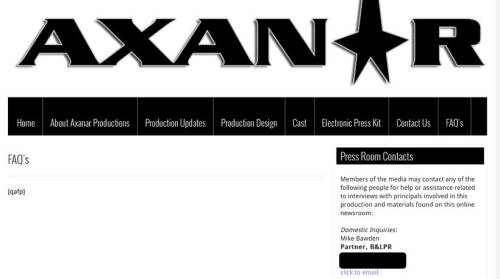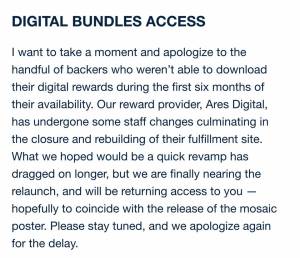This is an old revision of the document!
Table of Contents
Fact Check
Podcast: Financial Audit, More Subpoenas
More subpoenas, a completed audit of Axanar’s books and whom we might hear from at the copyright infringement trial were among the news in Axanar’s latest podcast episode, featuring producer Alec Peters, director Robert Meyer Burnett and co-writer Bill Hunt.
 FACT CHECK is an AxaMonitor series examining claims made with regard to Axanar, chiefly Alec Peters’ blog posts, interviews and public announcements. Read the series »
FACT CHECK is an AxaMonitor series examining claims made with regard to Axanar, chiefly Alec Peters’ blog posts, interviews and public announcements. Read the series »
The trio appeared on episode 40 of the official Axanar Podcast, hosted by Trek.fm, to discuss the lawsuit, what Star Trek means to them and to mark its 50th anniversary by recalling favorite episodes and films.
Lawsuit News
Peters opened the podcast with news about the lawsuit brought against him and Axanar Productions by CBS and Paramount, Star Trek’s copyright holders.
More Subpoenas
With the case currently in discovery, Peters confirmed that Hunt, co-writer of Axanar‘s script, had received his subpoena for a deposition in October.
Peters himself, of course, is scheduled to be deposed, but Burnett complained, “I have yet to get any kind of subpoena,” adding he had been “through a Hollywood deposition before, and it’s kind of fun.”
See also: ‘Prelude’ Director's Deposition Postponed
Peters characterized the subpoena as simply, “show up to the deposition and we’ll talk about some stuff.” Among the materials requested in the subpoena were “anything we did that was inspired by Star Trek.” He said he would stipulate that Axanar is Star Trek.
True or False?
PARTLY TRUE The Depositions. Showing up to ‘talk about some stuff’ oversimplifies both the nature of a deposition and the likely contents of the subpoenas Peters and Hunt were served. A deposition is a serious, often confrontational affair, like testifying in court. Deponents testify under oath, and everything is documented on video and by a court reporter. As AxaMonitor has reported, the subpoenas served on former Axanar chief technologist Terry McIntosh and Prelude director Christian Gossett were 17-page long documents which went into great detail regarding the documents deponents must produce and topics they were likely to be questioned about. It’s likely Hunt’s and Peters’ subpoenas were similarly detailed.
TRUE Stipulating Star Trek. Gossett’s and McIntosh’s subpoenas also included a request for pre-existing writings or audio-visual works upon which any part of Axanar is based, or from which any of the Axanar Works arose. Peters’ stipulation that “Axanar is Star Trek” syncs with his emerging defense theory — that Axanar does copy Star Trek elements but that the unauthorized copying falls under copyright law’s fair use.
Lining Up Copyright Experts
Meanwhile, Peters said the defense is working on finding experts to testify in favor of Axanar’s emerging fair use defense. “It’s certainly a case that all Hollywood knows about,” he added.
“We have three different amazing experts who’ve offered to lend their services,” Peters said. “A lot of people have said to me they want to see this case go to trial, that it is an important case for Hollywood and artists’ rights.” Among them, he added, are “scholars [who] feel that copyright law has gotten out of hand in this country.”
Hunt pointed to a current copyright case surrounding the Buck Rogers character, who by rights should be in the public domain, while heirs of the creator assert they still hold copyright over the property. And in Canada, Peters added, Ian Fleming’s James Bond books (not the films) have fallen into the public domain.
True or False?
UNKNOWN Expert Witnesses. Until such time as witness lists become public, we cannot yet confirm their identity or expertise.
TRUE Copyright Controversy. Some prominent scholars have questioned the extension of copyright protection in the United States to what they assert is an excessive term.
TRUE Hollywood’s Watching. It is true the case is being closely watched by Hollywood interests, since it threatens to upend the rights conferred by copyright ownership.
TRUE Buck and 007. The Hollywood Reporter reported on the Buck Rogers case. And the books by Fleming (1908-1964) did enter the public domain in 2015 in Canada, which adheres to the copyright terms outlined in the Berne Convention; the United States and Europe, however, confer longer terms. Even so, what the Canadian public domain allows is a matter of some controversy.
Financial Audit
Months after Peters said he would have Axanar’s finances independently examined, he revealed on the podcast, an accountant has completed a detailed financial audit covering the past two years. “Here’s every dollar that we spent,” Peters said, adding “CBS has it” for the lawsuit.
True or False?
UNKNOWN Unless Peters publicly discloses the audit findings, there’s no way to confirm his assertion that every dollar is accounted for, and whether the audit covers revenue apart from crowdfunding income, unless the financial report is used as evidence in the case. AxaMonitor has previously reported financial questions Peters had so far refused to account for, including contradictory reports about its current cash position.
Mission Creep
Burnett took the opportunity to refute the accusation the production had fallen prey to mission creep, stating “you make the movie for the money that you have,” and Axanar’s crowdfunding success created the opportunity for a higher quality film.
“What has creeped is our demand for the quality,” Peters said. “Once we made Prelude [to Axanar], there was no way we could make a fan film like any other fan film that had ever been made before because that would have disappointed fans.”
Peters pointed to his original intent to film on the upstate New York sets where Star Trek: New Voyages is shot, but then-Axanar director Christian Gossett “refused to shoot in New York. He wanted to create our own studio. It also cost a lot more.”
He added, “I will never apologize for wanting to produce what we all wanted to produce because it would’ve been exactly what the fans wanted.”
True or False?
FALSE No Mission Creep. Burnett’s description of how crowdfunding successes affected the scope of Axanar with the tantalizing prospect of the highest production quality of any fan film pretty much meets the textbook definition of mission creep:
Mission creep is the expansion of a project or mission beyond its original goals, often after initial successes. Mission creep is usually considered undesirable due to the dangerous path of each success breeding more ambitious attempts, only stopping when a final, often catastrophic, failure occurs.1)

MOSTLY FALSE Building a Studio. Peters lays the decision to build out a studio completely at the feet of Prelude director Gossett, who was set to direct Axanar but resigned in May 2015 over his concerns about Peters’ management of the budget and personnel. Gossett himself has disputed the narrative that it was his decision to build a studio. His concern about the sets in rural upstate New York was that the region didn’t offer the necessary infrastructure to support the full-fledged production anticipated for Axanar.
At the time, the desire for Axanar’s own studio — viewed as a potential income source — was Peters’ alone, said Gossett, who pleaded with Peters to temporarily rent studio space in Los Angeles for the few months required to produce Axanar, instead of committing to the three-year, quarter-million dollar lease to build Peters’ commercial venture, Industry Studios. The time and money required to convert a warehouse into a soundstage blew past Peters' budget and delayed shooting Axanar by almost two years.2)
Fan Film Guidelines
Axanar’s mission was always to work within the system CBS apparently had for fan films, Peters said, but the studio refused “numerous requests for guidance.” Peters has previously criticized the fan production guidelines CBS eventually introduced in June 2016 as “draconian.”
Burnett pointed out that Star Trek Continues has continued to produce episodes that exceed those guidelines’ restrictions on length (30 minutes maximum) and employment of current or former Star Trek employees like Vic Mignogna, who is a voice actor for the Star Trek Online game.
“That’s all good for us,” Peters said. “Part of our argument is that there’ve been fan films for 40 years, [CBS] has always allowed them.”
Axanar critics often say, “You stepped over the line?” Peters said. “What was the line? No one knows what the line is. They [CBS] wouldn’t tell us.”
Peters said he couldn’t imagine why CBS chose to sue Axanar over other fan films. “The difference between what Axanar raised [$1.2 million] and what [Star Trek:] Renegades raised, $800,000, is minor. This is not the deciding factor. Yes, we raised more than everyone else but we didn’t do anything that anyone else hasn’t done before. We just did it differently, with a little more panache, if you will.”
Peters said Spock actor Leonard Nimoy’s son, Adam, told him Prelude was the first fan film that he loved. “I think there’s a reason for that, and we’ve carried forward that dedication to a level of quality that I will … never apologize for.”
True or False?
PARTLY TRUE CBS Guidance. While it’s likely true that Peters asked CBS for guidance, copyright experts were unsurprised by the studio’s reticence. Up until now, copyright holders typically tolerated use of its copyrighted property in fan works that didn’t cross the line into a commercial venture.
FALSE Crossing the Line. Peters’ claim there was no line defined is not borne out even by his own earlier actions. The FAQ on the Axanar e-press center stated:
Q.: How can Axanar Productions produce a Star Trek film without the backing of the rights holder?
A.: For the past few decades, Star Trek and a few other sci-fi franchises have enjoyed a cooperative/symbiotic relationship between fan-produced productions and the owners of the intellectual property. In general, CBS (the rights holder) allows independent Star Trek products as long as the venture is non-commercial.3)
Curiously, that text was scrubbed from that Axanar press site, as this comparison shows, between January and September 2016. The notion that commercialization crossed the line was well known among the fan film community; Peters even called out other productions that tried it, and at a much smaller scale than Axanar. Four months before filing suit, CBS publicly warned Peters of the dangerous legal territory he was treading upon, describing Axanar as a “professional commercial venture trading off our property rights,” and that the studio was “considering further options to protect these rights.”4)
TRUE Star Trek Continues. Burnett is correct. Star Trek Continues planned to end its run with four final episodes, all of which were to be produced outside CBS’ fan film guidelines. However, CBS did not promise to sue any production that failed to meet any of the guidelines. How Axanar may use Continues in its defense against copyright infringement had yet to be seen.
FALSE Just Like Other Fan Films. As a matter of scale, Peters attempted to portray Axanar‘s crowdfunding as essentially the same as Star Trek: Renegades (which has since stripped Star Trek elements from its production). In fact, however, the $1.2 million figure Peters quotes ignores the fact up until the lawsuit it was still raising money to support Axanar‘s ultimate budget of nearly $2 million, more than twice Renegades’. The commercial aspects of Axanar’s self-avowed professional operation — and their expansive scale — are what CBS and Paramount said distinguished the production from other fan films. Peters’ characterization is an attempt to place Axanar under the same umbrella of perceived safety as other fan productions.
Helping Nimoy
Peters told the story of when the younger Nimoy turned to him for help on the Kickstarter campaign to fund production of the acclaimed documentary about Adam’s father, For the Love of Spock, which was released in Summer 2016.
Burnett recounted, “Adam asked, ‘how did you guys do what you did, how did you raise that money?’” in a meeting held on the Paramount Pictures lot.
“I basically helped Adam Nimoy with his Kickstarter,” Peters said. “I’m not going to take credit for it, but I helped him out with some free advice, and Diana helped him out with perks; they used Ares Digital.”
True or False?
TRUE Helping Nimoy. By all accounts, Peters did help Nimoy in his crowdfunding efforts, and Nimoy did use the beta version of Axanar’s Ares Digital for fulfilling perks. Peters appears in the “special thanks” section of the credits in For the Love of Spock.
FALSE Taking Credit. The week before the Axanar podcast, Peters wrote the following on his blog, and in an email update sent to his newsletter list:
First of all, Team Axanar are good friends with Adam Nimoy. We helped Adam with his 2015 Kickstarter for his documentary “For The Love of Spock”, which is a truly wonderful movie I hope you will all go see.5)
PARTLY TRUE Ares Digital. It is true that Nimoy’s Kickstarter used the beta version of Ares Digital, which has since been scrapped after it utterly failed to handle shipping of Axanar’s own perks to its donors. Peters gives the arrangement a cursory mention in the podcast, but none at all in his published blog. This public apology on July 19, 2016, from Nimoy to his Kickstarter backers may be why.
The Other Discovery
While the lawsuit is in discovery, Peters remarked it was ironic that Star Trek: Discovery, the upcoming television series, had recently been delayed from its original January 2017 premiere (the same month as the beginning of Axanar’s trial) to May. “Discovery … is set in 2255, the same year as Prelude to Axanar,” Peters observed. “I just find that an interesting point.”
Others have concluded that being set in the same year as Axanar’s mockumentary indicates Discovery has taken story elements from Axanar.
Hunt, Peters and Burnett said they admired Discovery showrunner Bryan Fuller’s talent, and Peters added, “I know he is a big fan of Axanar because I met him and he told us he was.”
But Peters criticized Fuller’s approach to the time period in which Discovery is to be set, which Fuller said would reimagine many visual elements. “By changing the look and feel of a known timeframe, [Discovery] can’t be in the Prime timeline.”
By contrast, he added, “The thing we’re trying to do with Axanar is … we’re not reimagining Star Trek. We’re fitting it into the canon.”
True or False?
MOSTLY FALSE Discovery vs. Axanar. Ever since Fuller announced the setting of the new Star Trek series, Axanar supporters have peddled the narrative that the overlapping time period between the two had to mean Fuller lifted story ideas from Axanar. Evidence fails to bear this out (“Discovery-Axanar Speculation Fuels Spurious Debate”).
DUBIOUS Year 2255. Peters talks around his “interesting point” that Prelude to Axanar is set in the same year as Star Trek: Discovery, leaving it to others to make assumptions about a fact-free connection between Axanar and Discovery. Realize what “the same year as Prelude” actually means — the year in which a fictional documentary of a non-canon fictional event 10 years earlier in a fictional timeline was fictionally broadcast in a fictional universe.
DUBIOUS Fuller, Axanar Fan? Peters’ claim Fuller is a “big fan of Axanar” seems to be at odds with the Discovery producer’s recent Q&A with Den of Geek:
Q. What is this Starfleet event [on which Discovery is said to be based]?
A. You have to ask a specific question.
Q. Is it Axanar?
A. I actually don’t know what the history of Axanar is. 6)
Alleged Owners
Peters also took aim at Discovery‘s studio, CBS, which he described as, “the ‘current occupants’ that allegedly, I’m going to say allegedly, own Star Trek. They still have to prove that in court right now.”
Peters recently called into question the validity of CBS’ ownership of Star Trek, adding, “There’s no one there who gives a damn about Star Trek.”
Then he and Burnett started naming CBS executives, such as vice-president of product development John Van Citters, whom they said did care about Star Trek. Peters then specified he meant chief executive-level people at the studio.
True or False?
MOSTLY FALSE Alleged Owners. Peters continued to push this narrative. AxaMonitor fact-checked it on September 22, 2016.
Access for None
Though he was a big fan of Fuller’s work on the TV series, Hannibal, Burnett worried Discovery‘s writers would be hampered by Star Trek continuity in the new show’s pre-Original Series setting. Peters agreed: “It’s a mistake to go back in time.”
All three declared they would not subscribe to the U.S. network that will carry Star Trek: Discovery, CBS All Access, preferring to wait for a later Blu-ray release, and complaining of the $5.99 monthly cost (with commercials) or $9.99 (commercial-free).
True or False?
DUBIOUS All Access Cost. Peters, Burnett and Hunt objected to the subscription cost of CBS All Access, particularly the commercial-free option, as if this approach were unheard of. In fact, it’s exactly the same arrangement (though less expensive) that Hulu offers its subscribers ($7.99 a month with commercials, $11.99 without commercials). 
Keywords







